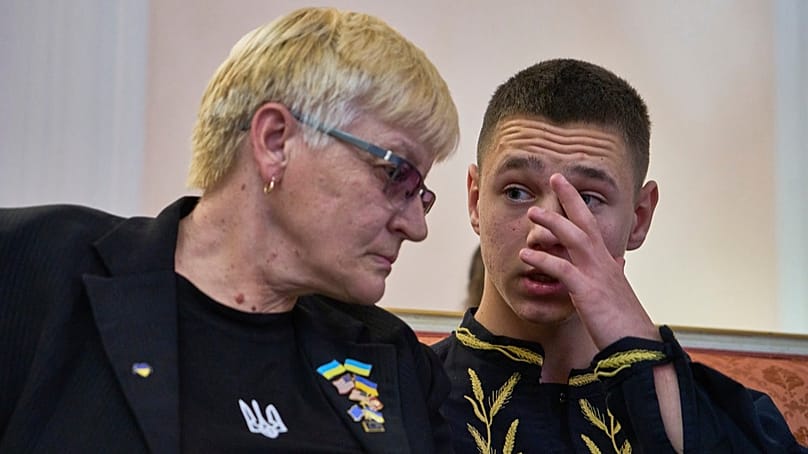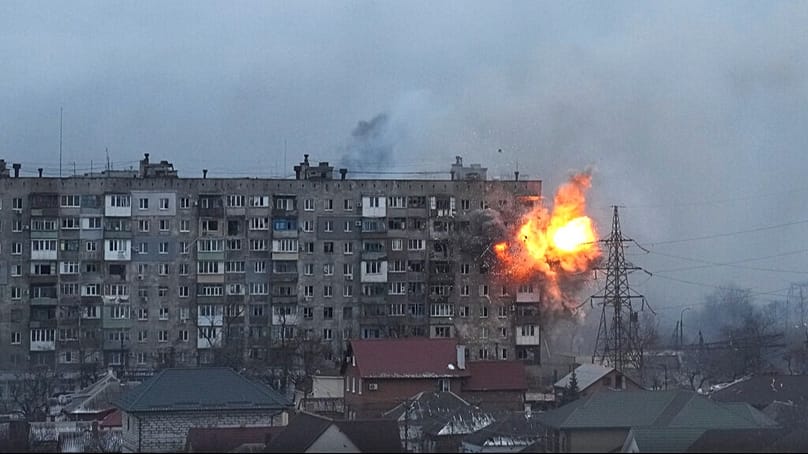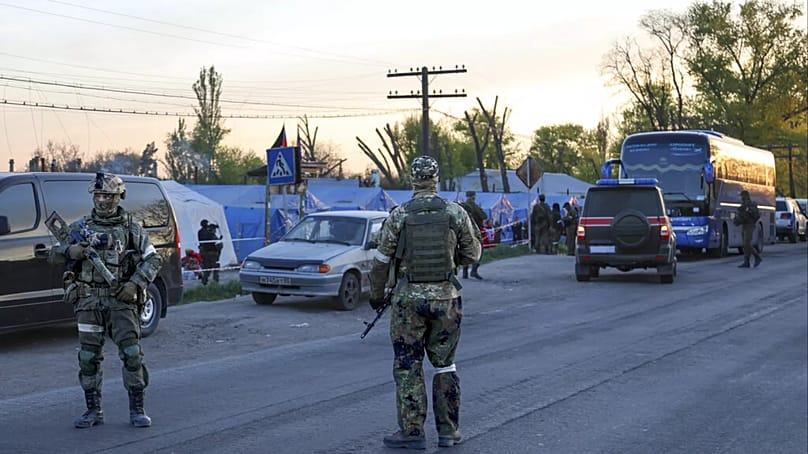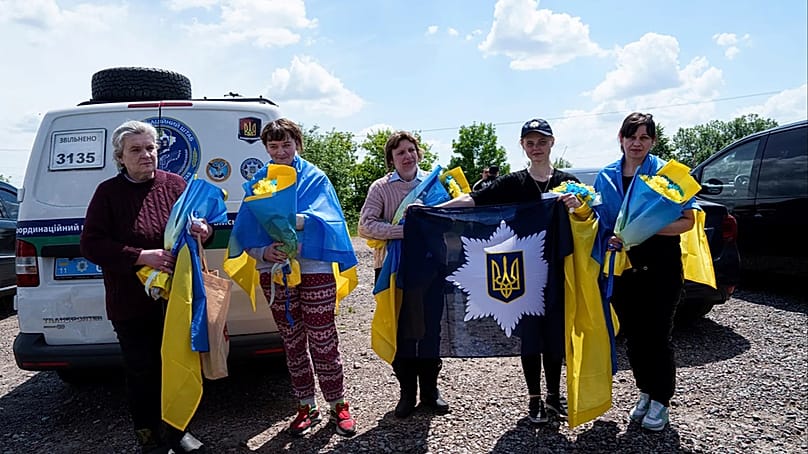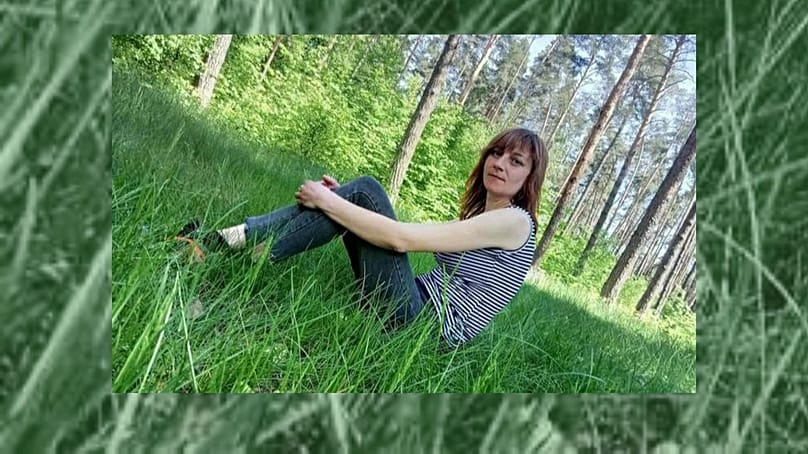For over a year, Euronews has been in regular contact with Lyudmyla, a grandmother doing everything she can to find her daughter. Hers is one of thousands of Ukrainian families whose loved ones have vanished without a trace since Russia's full-scale invasion.
The recently leaked 28-point "peace plan" put forward by the United States and Russia included the creation of a humanitarian committee, which would be tasked with overseeing prisoner-of-war exchanges as well as the release of all civilian detainees and children.
 ADVERTISEMENT
ADVERTISEMENT
 ADVERTISEMENT
ADVERTISEMENT
Ukrainian Nobel Peace Prize laureate and human rights lawyer Oleksandra Matviichuk told Euronews that in an earlier draft of the 28 points, the section on releasing illegally detained civilians, returning Ukrainian children, and exchanging prisoners of war was not written as a binding requirement for Russia.
"It only mentioned a humanitarian committee that should deal with these issues. The more abstractly and variably this point is formulated, the less chance it has of being successfully implemented," she explained.
The exact number of Ukrainian POWs held in Russia or in Russian-occupied parts of Ukraine remains unclear, but estimates range into the many thousands. On top of that, at least 16,000 civilians are believed to be held captive by Russia or Russian-backed separatists.
At least 70,000 Ukrainians are officially listed as missing, though the real number is believed to be far higher.
Among them is 34-year-old Snizhana.
Euronews first reported on Snizhana's story in May last year, recounting how her son Sasha was rescued from Russian-occupied Donetsk by his grandmother, Lyudmyla. Since then, Euronews has stayed in contact with Lyudmyla and kept up with her search for her daughter.
After rescuing her grandson Sasha, she promised him she would do everything in her power to find his mother – a promise Lyudmyla has kept every single day.
The relentless search for the missing
Last week, 15-year-old Sasha and his grandmother travelled to Rome. He was part of a delegation of rescued Ukrainian children and teenagers who had been deported and abducted by Russian forces.
In Rome, the children delivered a letter from Ukrainian President Volodymyr Zelenskyy to the Vatican, asking the Holy See to help mediate the return of Ukrainians taken by Russia - a request that holds particular significance for Sasha and his grandmother.
"People are doing well here," Lyudmyla said. The two had a little time to explore the city, but events like this are overwhelming for them.
Lyudmyla managed to rescue him from the Russians, but her mission won't be complete until she finds her daughter. After their short stay in Italy, they returned to Ukraine, to the village of Druzhba in the northeastern Chernihiv region.
Sasha last saw his mother in March 2022. Since then, she has been missing.
Lyudmyla rescues her grandson from the Russians
Before the full-scale invasion, Sasha lived in the Ukrainian port city of Mariupol with his mother, his younger half-sister, and his stepfather. During the first days of the invasion, Mariupol came under relentless attack by Russian forces: tanks rolled through the streets, and bombs rained from the sky. The NGO Red Cross described the siege of the city as "apocalyptic".
The then 11-year-old Sasha and his family hid in a basement to protect themselves. As food became scarce, they were forced to cook outdoors over open flames. Without shelter, they were exposed to Russian missiles, risking their lives for every meal.
Suddenly, a missile struck, Sasha recalled in an interview with Euronews. He ran into a nearby house to find his mother and sister; the blast shattered the windows, and the little boy was injured underneath his eye.
Snizhana acted quickly, grabbing her son and leaving the rest of the family behind. Her goal was to reach a factory where Sasha could receive medical attention. When they arrived, Russian forces surrounded and captured them.
Shortly afterward, soldiers separated Snizhana and Sasha. The then 11-year-old was taken to a hospital, where he was told that his mother no longer wanted him. Once recovered, he was supposed to be sent to an "Internat" in Russia.
By a stroke of luck, he managed to get hold of a phone at the hospital and called his grandmother, Lyudmyla. After several weeks of preparation, she travelled to Donetsk and rescued her grandson.
But the question of where her daughter Snizhana was has weighed on her mind ever since, and still does today.
Russian 'filtration camps'
Sasha doesn't know what happened to his mother. What he does remember is that her phone was taken away and she was taken to a so-called "filtration camp".
About 30 kilometers east of Mariupol lies a camp called Bezimenne. Almost symbolically, the village's name resembles the Ukrainian words for "without name" (без імені / bez imeni).
Sasha told Euronews about a short car ride, suggesting that Snizhana was likely taken to this camp, which was also known as the "ghetto". Before it became a detention facility, the site was once a school on the Sea of Azov. The BBC reported that in March 2022, Russia held an estimated 5,000 people in the makeshift camp.
The purpose of these "filtration camps" was to "screen" Ukrainians from Russian-occupied areas for their "status" and "affiliations". People had their passports, phones, and other documents confiscated.
Reports detail inhumane conditions in the camps, with prisoners threatened with torture or death, and there have been accounts of extrajudicial executions.
Russian soldiers reportedly search the phones for any links to the Ukrainian armed forces or messages showing a pro-Ukrainian stance. Punishments depend on what is found: those suspected of having ties to the Ukrainian military are often treated as prisoners of war.
Was Snizaha in the Ukrainian Armed Forces?
It's unclear what Snizhana had on her phone. While she was not a soldier, she did have connections to the military. In 2015 - one year after the Russian attack on Ukraine began- Snizhana started working as a lab technician in a military unit in Itschnya, in Ukraine's Chernihiv region.
"She worked for the army but was never a soldier," her mother emphasised. Three years later, Snizhana met her husband, a soldier. "We live in a military settlement. There are civilian employees there," her mother explained.
Depending on the information, photos, or messages on Snizhana's phone, she could have been identified in the filtration camp as connected to the Ukrainian Armed Forces, either because of her husband or her previous work, and detained by Russian forces as a prisoner of war.
Desperate, Lyudmyla wrote letters to various authorities – including in Mariupol — and to lawyers, pleading: "Help me find my daughter!"
For a long time, she heard nothing. But after contacting the "Ministry of Internal Affairs" of the so-called "Donetsk People's Republic" in April 2022, she received a call years later confirming that her daughter was in captivity. No further details or evidence were provided.
"They told me to create an account with the [Prisoner of War Coordination] staff. I did that. They said it was accepted. God willing, maybe she will be added to the exchange lists, swapped, and released," Lyudmyla told Euronews.
Since then, several prisoners of war have been exchanged. Snizhana, however, has not been part of any exchange.
Hope in prisoner exchanges
Since that small glimmer of hope, Sasha and Lyudmyla have heard nothing – no sign of life, no updates on where Snizhana is or what condition she is in.
"The Russians are not putting my daughter on the exchange list," she wrote to me in September 2024. "She is being held illegally in the detention center in Donetsk," Lyudmyla suspected. "They have probably imposed some kind of punishment on her."
She added: "Our side is doing everything possible to secure an exchange, but for some reason the Russian side isn't allowing it."
The treatment of Ukrainian prisoners of war, including women, by Russia has been marked by systematic torture, humiliation, and psychological abuse. Survivors told British newspaper the Telegraph that they were beaten, tortured with electric shocks, denied medical care, deprived of sleep, and subjected to relentless interrogations.
Female prisoners of war are subjected to the same violence as men, but face gender-specific abuse, including being forced to march naked in the snow or stripped in front of their captors – acts that amount to clear sexual humiliation. There are also reports of rape and other sexual assaults.
Both men and women leave captivity severely traumatised – underfed, frightened, and conditioned to believe they are worthless.
Sasha and Lyudmyla will never give up
Sasha is now a teenager, with two more years of school ahead of him. He already knows what he wants to do afterward: become a first responder.
Since the start of the full-scale invasion, many Ukrainian children have dreamed of careers dedicated to saving others. Like many Ukrainian children, much of Sasha's childhood has been marked by war – nightly drone and missile attacks, and the constant dash to bomb shelters. Not knowing what happened to his mother is heartbreaking for both Sasha and Lyudmyla.
"He suffers because of his mother," his grandmother explained, sharing the same daily pain.
Since Lyudmyla rescued Sasha from Donetsk, the two have never given up hope and continue their tireless search for Snizhana. They travel abroad, appealing to heads of state and government for help.
"We hold on and wait. We believe she will be found and come back to us. We pray for Ukraine, for peace, and for the safe return of all our defenders," Sasha's grandmother said.
'Our trips won't stop the enemy'
While they are still in Rome, Lyudmyla told Euronews that there is still no news of Snizhana. She continues to share her daughter's photo and information in missing-person groups on Telegram, travels with Sasha to meet politicians, and tirelessly searches for new ways to find her.
According to Nobel Peace Prize laureate Oleksandra Matviichuk, the media attention these stories bring is especially important.
"Russia seeks to deceive the world and present itself as a country that protects the values of family and tradition," she explained. "Instead, the Russians themselves launched the war of aggression. They are killing civilians, kidnapping children, raping women, imprisoning teachers, torturing priests, and robbing the population."
"The coverage of stories is important because it convincingly demonstrates the falsity of the Kremlin's words. You can argue with arguments about geopolitics, but you cannot deny concrete human stories," Matviichuk said.
"Russia continues to kill us," Liudmyla added. "Our travels won't stop the enemy. But we, the people of Ukraine, are strong – we will endure. The truth is with us. God is with us. Russia cannot break us."











